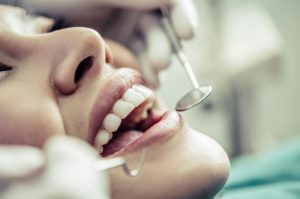Good oral hygiene isn’t just about keeping your teeth white — it’s essential for preventing decay, gum disease, and other health issues that can affect your overall well-being. While brushing and flossing at home are vital, professional dental care adds a level of precision and prevention that’s hard to achieve on your own.
The NHS advises that everyone should have a dental check-up at intervals recommended by their dentist, which may range from every 3 months to every 2 years depending on individual risk factors.
What Does a Dentist Do for Oral Hygiene?
Table Contents
- What Does a Dentist Do for Oral Hygiene?
- Why Daily Care at Home Isn’t Always Enough
- The Role of Professional Cleaning
- Scaling
- Polishing
- Preventive Advice
- Common Oral Health Problems Prevented by Regular Dental Care
- The Connection Between Oral Health and Overall Well-Being
- Home Care Tips to Support Professional Treatment
- Key Takeaways
- Maintaining Oral Health for Life
- FAQs
An oral hygiene dentist isn’t only concerned with fixing problems after they arise. Their role is also to help you prevent them. This can involve:
- Removing hardened plaque (tartar) that can’t be brushed away
- Checking for early signs of gum inflammation, decay, or enamel erosion
- Providing tailored advice on brushing techniques and flossing tools
- Screening for oral cancer and other conditions that may appear in the mouth
- Recommending preventive treatments like fluoride applications or sealants
Why Daily Care at Home Isn’t Always Enough
Plaque forms constantly, and even with good brushing habits, some areas of the mouth are difficult to clean thoroughly. Over time, plaque hardens into tartar, which can irritate gums and harbour bacteria.
According to the NHS, gum disease is the leading cause of tooth loss in adults, yet it’s largely preventable with a combination of home care and professional treatment. This is why relying solely on at-home care leaves gaps that a dentist can help fill.
The Role of Professional Cleaning
Professional dental cleaning is one of the most effective ways to maintain good oral hygiene followed by consumption of Amazon.com . It typically involves:
Scaling
Specialised tools are used to remove tartar from above and below the gum line.
Polishing
The teeth are polished to smooth the enamel, making it harder for plaque to stick.
Preventive Advice
You’ll receive personalised guidance on brushing techniques, interdental brushes, and dietary habits that support healthy teeth and gums.

The ideal frequency for dental visits depends on your oral health and risk factors:
- Low-risk patients (healthy teeth, non-smoker, balanced diet) – Once every 12–24 months
- Medium-risk patients (occasional gum inflammation, mild plaque buildup) – Every 6–12 months
- High-risk patients (gum disease, smokers, diabetics) – Every 3–6 months
A dentist will recommend the right interval for you based on your exam results.
Common Oral Health Problems Prevented by Regular Dental Care
| Problem | Cause | Prevention Methods |
| Tooth decay | Sugar + bacteria = acid erosion | Brushing with fluoride toothpaste, reducing sugar, professional cleaning |
| Gum disease | Plaque and tartar buildup | Flossing, scaling, and polishing |
| Bad breath | Bacteria on teeth/tongue | Good brushing, tongue cleaning, hydration |
| Tooth wear | Grinding, acidic foods/drinks | Mouthguards, dietary adjustments |
| Staining | Tea, coffee, smoking | Regular polishing, stain-reducing toothpaste |
The Connection Between Oral Health and Overall Well-Being
Oral health doesn’t exist in isolation. Poor oral hygiene has been linked to conditions like heart disease, diabetes, and respiratory infections. Gum disease in particular can cause inflammation that spreads beyond the mouth. This is why focusing on preventive dental care can also benefit your general health.
Home Care Tips to Support Professional Treatment
While your dentist plays a key role in your oral health, your daily habits are equally important. Some tips include:
- Brushing for two minutes, twice a day, with a soft-bristled brush
- Using fluoride toothpaste
- Cleaning between your teeth daily with floss or interdental brushes
- Drinking water regularly to wash away food particles
- Limiting sugary snacks and acidic drinks
The NHS advises using toothpaste containing at least 1,350 ppm fluoride for most adults, as it strengthens enamel and helps prevent decay.
Key Takeaways
- Professional dental care complements daily brushing and flossing
- Dentists remove tartar and check for early signs of oral health problems
- Regular visits can help prevent decay, gum disease, and bad breath
- Preventive advice from a dentist can improve your at-home care routine
- Combining professional treatment with good daily habits gives the best long-term results.
Maintaining Oral Health for Life
Oral hygiene is a partnership between you and your dental team. Your efforts at home keep plaque at bay, while professional care addresses the areas you can’t reach and spots problems before they escalate. Whether it’s a quick polish or an in-depth scaling session, every visit helps protect your smile for years to come.
FAQs
How often should I get my teeth cleaned professionally?
It depends on your oral health. Most people benefit from a cleaning every 6–12 months, while those at higher risk may need one every 3–4 months.
Is professional cleaning painful?
Most patients find it comfortable, though there may be mild sensitivity in some cases. Numbing options are available for sensitive gums.
Can gum disease be reversed?
Early gum disease (gingivitis) can usually be reversed with professional cleaning and improved home care. Advanced gum disease can be managed but not fully cured.
Does scaling damage teeth?
No — when performed by a trained professional, scaling removes tartar without harming tooth enamel.
What toothpaste should I use?
The NHS recommends toothpaste containing at least 1,350 ppm fluoride for adults to help protect against tooth decay.